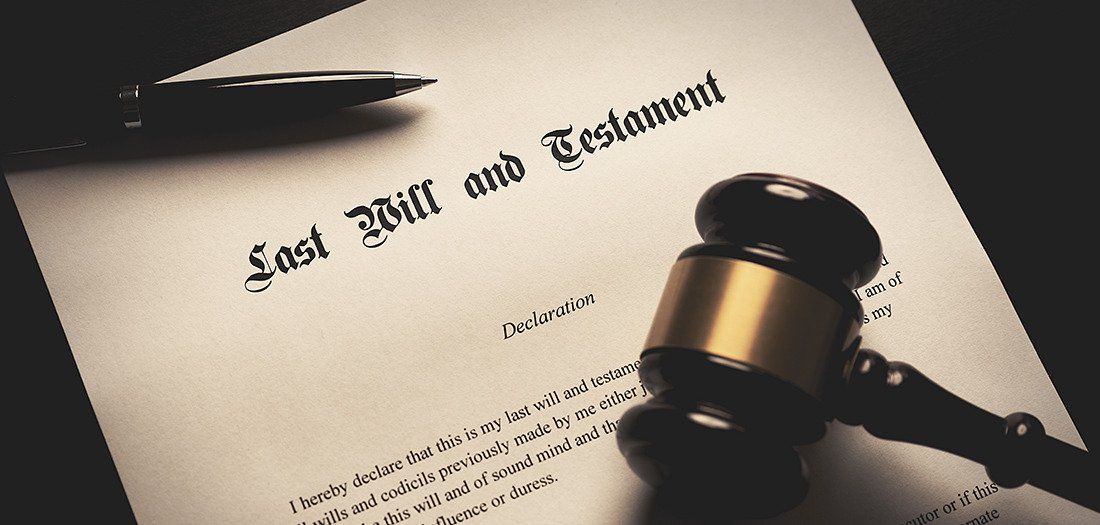No-contest clauses in wills are supposed to deter beneficiaries from challenging a will in court. They usually are unimportant because often the beneficiary would receive the same amount from the estate with or without a will. But a carefully designed no-contest clause, coupled with a small inheritance, can ward off a will challenge.
A person who makes a will is called a testator. When a testator makes a will, the testator wants the will to be enforced as written. For that reason, sometimes a testator will insert a clause into a will stating that if anyone challenges the will, they are disinherited. Lawyers call these "in terrorem" clauses, from the Latin, which means that they are designed to frighten beneficiaries from challenging a will. Most people call these clauses "no-contest" clauses.
If a beneficiary challenges a will, and fails, the result is that the beneficiary takes nothing under the will. If a beneficiary challenges the will but succeeds, then the will is set aside and the property passes under state law as though the testator had not left a will. Each state has enacted such statutes, which are called "intestacy" statutes. These statutes vary considerably from state to state.
Example of a no-contest clause
What do no-contest clauses look like? Normally, there will be a separate paragraph in the will called "In Terrorem Clause" or "No-Contest Clause." Here is a short example of a no-contest clause:
"If any person shall at any time commence proceedings in any court to have this will set aside or declared invalid or to contest any part or all of the provisions included in this will, they shall forfeit any interest in my estate."
There are much, much longer examples we could examine, but let's move on before our eyes glaze over.
Do no-contest clauses work?
When we ask whether a no-contest clause works, the real question is whether the no-contest clause will cause a disgruntled or disinherited beneficiary to think twice before challenging a testator's will. But often, even if a challenge to a will is successful, the challenge will make no difference to the ultimate distribution of property because the beneficiaries would receive the same share of the testator's property under the intestacy statutes. For that reason, many lawyers are reluctant to include these clauses in wills. Also, certain types of lawsuits - for example, to ask about the circumstances surrounding the signing of the will - don't necessarily involve the no-contest clause and will not result in a beneficiary's inheritance being lost even if the beneficiary loses the lawsuit.
Three situations
Let's take a typical situation: A widowed parent's will leaves her entire estate of $100,000 equally to her three children. But in this situation, intestacy statutes commonly provide that in the absence of a will, each of the three kids would take a one-third share of the estate. What point would there be in challenging the will when a beneficiary's share would be the same with or without a will?
Let's build on our example to see how a no-contest clause actually could promote a challenge to a will. Suppose the testator had financially supported one of her children while the other two did not need support. Or suppose the testator believed that one of her children would fritter away their inheritance on gambling, drugs and other vices. The testator accordingly decided to disinherit that child, leaving two of the children $50,000 apiece. Since the disinherited child would receive nothing under the will, but a one-third share of the testator's estate if the child successfully challenged the will, what would the disinherited child have to lose from a no-contest clause?
But there is one situation where no-contest clauses can work. The best way to avoid a will contest is to leave the child enough of the estate to make losing a will contest costly under a no-contest provision. Once again, following our example, suppose the testator had an estate of $100,000 to distribute. The testator might then leave $10,000 to the child she would rather disinherit, but leave her other two children $45,000 apiece. If the child receiving $10,000 challenged the estate and lost, then that child would lose the $10,000. If the child won a will contest, and the money passed by intestacy, the child would receive $33,333 instead of $10,000. Therefore, a successful will challenge would represent a possible gain over the $10,000 of $23,333.
"Is it worth it," that child must ask, "to gamble $10,000 to try to win an extra $23,333?" Hopefully, from the point of view of the testator and the other two children, the answer would be "no."
| Summary of No-Contest Clause Results | |
|---|---|
| Situations | Effect of No-Contest Clause |
| Will leaves $100,000 to three children in equal shares. | No-contest clause is irrelevant. No point in challenging will when beneficiary would receive the same amount without will. |
| Will leaves $50,000 to two children in equal shares but disinherits third child. | No-contest clause does not help to prevent will challenge. Beneficiary receives nothing under will, will receive nothing if will challenge ineffective, so why not challenge the will? |
| Will leaves $45,000 to two children in equal shares and $10,000 to third child. | No-contest clause can prevent will challenge. Is third child willing to gamble $10,000 to try to get $33,333, the one-third the child would receive absent the will? |
No-contest clauses don't prevent all testamentary lawsuits
One of the issues that so frequently comes up in testamentary litigation is whether older testators knew what they were doing when they signed their wills. In the most flamboyant cases, the older person is induced to leave their estate to a much younger person who is not the natural object of their affection. Will contests then frequently inquire as to the competency of the testator.
Competency challenges are generally based on one or more of three common contentions: That the testator was defrauded, under duress or subject to undue influence. These contentions overlap, but they differ, too. Black's Law Dictionary offers various definitions of these terms:
- Fraud is a deceitful practice or willful device that tricks the testator. The classic examples are obtaining a signature by telling the testator they are signing something else or swapping out a page just before signature.
- Duress means that the testator has been threatened or coerced to sign the will. An example would be threatening to cease caring for a testator if not made a beneficiary of a will.
- Undue influence amounts to overpowering a testator's willpower so that the will does not set forth the testator's true intent. An example would be badgering the testator endlessly until the testator gives in.
Yes, each of these terrible things, and more, can and do happen. But a lawsuit that merely inquires about these issues - as opposed to directly seeking to void a will - often will not violate a no-contest clause. As stated earlier, there is considerable variation in the law governing no-contest clauses among the states.
Summary of no-contest clauses
Most of the time no-contest clauses have no effect on a beneficiary's decision to challenge a will. If the beneficiary would receive the same amount under the will or the intestacy statutes, there's no point in challenging the will. If the would-be beneficiary is disinherited, there's no downside to challenging the will. Only when the testator leaves a beneficiary enough to make a will contest risky might a no-contest clause ward off a will challenge. Also, merely inquiring into the circumstances surrounding the execution of a will often won't violate a no-contest clause. In short, one way or another, no contest clauses usually do not keep a disgruntled or disinherited beneficiary from filing suit.
The most important thing a testator can do to make sure that their wishes are followed is to execute the will with the lawyer present. A lawyer will question the testator and go over the terms of the will before signature. The lawyer will not allow a testator to sign a will if the lawyer believes the testator has been defrauded, is under duress or has been subjected to undue influence. The careful lawyer will actually video the entire signing to establish evidence that the testator's will leaves the estate the way the testator wanted.



